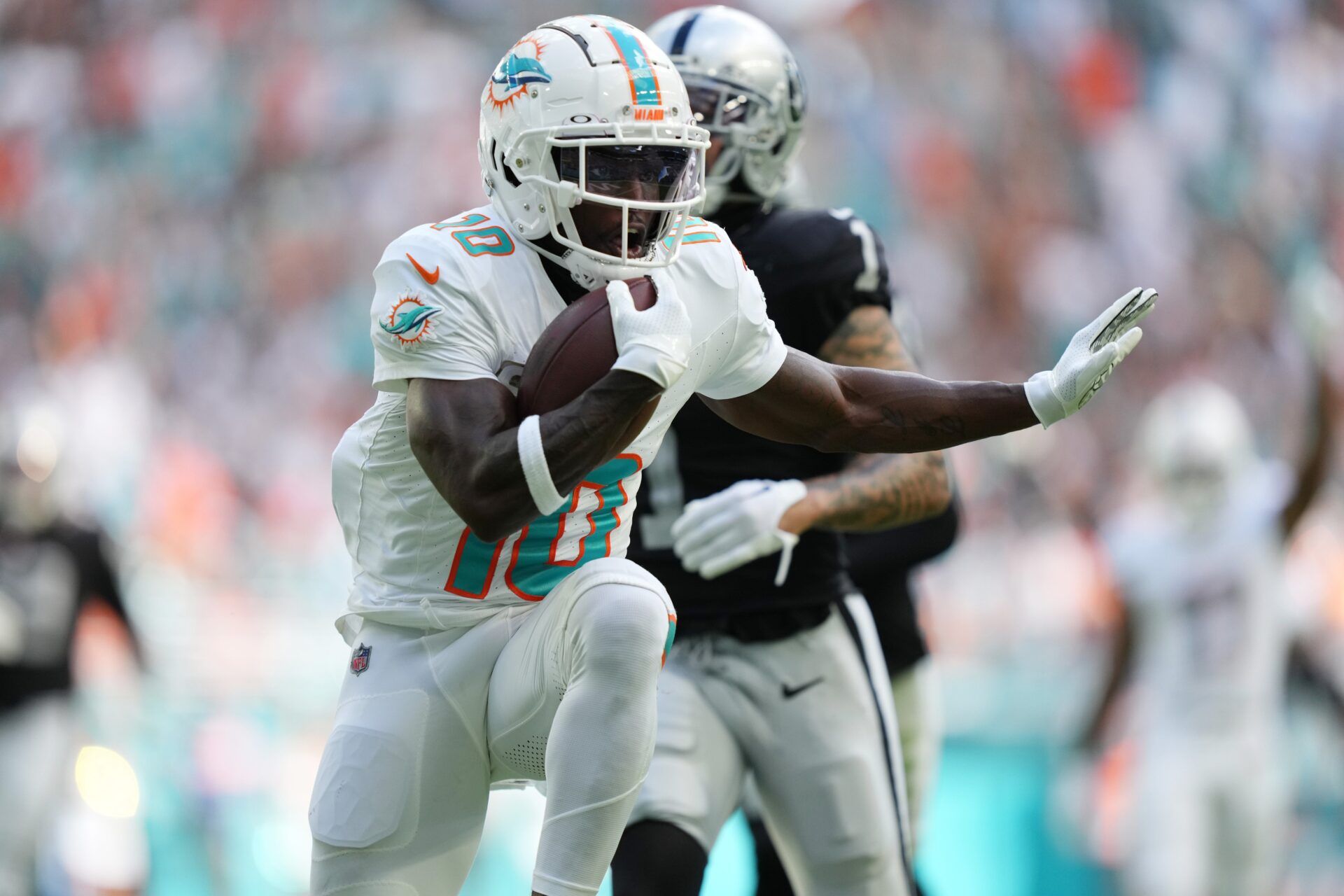Miami Dolphins wide receiver Tyreek Hill has been named the best player in the NFL by his peers. The sportswriters who decide the league MVP award — and the Dolphins contract negotiators inside team headquarters — should take note.
Friday’s announcement that Hill finished first in the NFL Top 100 — and the first time a wide receiver has ever claimed the top spot in this list — doesn’t change everything. But it should change a lot.
Let’s set aside, for now, the fact that Hill and his agent, Drew Rosenhaus, now have a massive bargaining chip in their ongoing negotiations with the Dolphins for a contract extension. That’s a story for another day.
What demands immediate attention, however, are the broader implications of Hill’s climb to the top of the NFL Top 100.
In a league dominated by quarterbacks, where the NFL MVP award often feels like a birthright for the game’s signal-callers, Hill’s achievement should ignite a new conversation: It’s time to challenge the NFL MVP debate and for voters to understand that the award should not be automatically penciled in every year to a quarterback.
Challenging the Quarterback-Dominated MVP Debate
To rethink the MVP conversation, however, requires a significant shift in thinking. Over the past decade, only one non-quarterback has won the award: Minnesota Vikings RB Adrian Peterson in 2012, who put up 2,097 yards on the ground, the second-most ever for a running back in a single season. And before that? San Diego Chargers RB LaDainian Tomlinson in 2006 and Seattle Seahawks RB Shaun Alexander in 2005.
Even more astonishing? No wide receiver has ever won the NFL MVP award.
Certainly, voters have plenty of reasons to focus on quarterbacks. They are the only player (besides the center) who touches the ball on nearly every offensive play, and as such, they are often seen as the most influential players on the field.
But the game has evolved. Receivers across the NFL, including the likes of Hill, Justin Jefferson, and Ja’Marr Chase, make a significant impact on the field and shoulder the responsibility of transforming their team’s offense. Without them, their teams struggle to move the ball. Hill’s top spot on the NFL Top 100 is a clear indication that his impact goes beyond mere statistics.
In his first season with the Dolphins, Hill faced skepticism about whether he could maintain his elite level of play without his former quarterback, Patrick Mahomes. In fact, he boldly stated that his new quarterback, Tua Tagovailoa, was the most accurate QB in the league.
Tyreek Hill says former Alabama QB Tua Tagovailoa is the most accurate quarterback in the NFL: pic.twitter.com/RIbnWy6Zad
— Sidelines – Bama (@SSN_Alabama) July 26, 2022
When the season began, Hill backed up his words with career highs in receptions (119) and receiving yards (1,710). His impact on the Dolphins’ offense was immediate, helping turn Miami into a playoff contender.
Last season, Hill — who is ranked seventh in the Pro Football Network Top 100 Players of 2024 — led the league in receiving yards (1,799) and receiving TDs (13) and finished second in receptions (119) despite running just the 41st-most routes of any wide receiver. His efficiency was astounding, as his 3.85 yards-per-route-run mark blew the modern record out of the water.
FREE: Subscribe to PFN’s NFL Newsletter
But we need to look beyond the box score.
Hill’s ability to stretch the field with his speed, create separation with his route running, and turn short passes into long gains has made him an invaluable asset to the Dolphins.
Opposing defenses focus their entire game plan around containing him, and his presence on the field keeps defensive coordinators awake at night as they try to figure out ways to account for his speed. This, in turn, creates opportunities for the other skill players on the field, and his ability to deliver in high-pressure situations truly defines his value.
Redefining the Concept of Value in the NFL MVP Race
Hill’s rise to the number one spot in the NFL Top 100 should catalyze a wider discussion about what it means to be the NFL MVP. While quarterbacks will always be the primary point of an offense, the evolution of today’s game has shown us that players in other positions can be just as impactful, if not more so, in certain contexts.
For too long, the MVP discussion has been narrowly focused on quarterbacks, often overlooking the contributions of players like Hill, who fundamentally alter the dynamics of the game. Hill’s recognition by his peers is a reminder that value in the NFL can come in many forms — speed, playmaking ability, and the capacity to change the course of a game in an instant.
MORE: Simulate the NFL Season With PFN’s Playoff Predictor
The MVP is meant to recognize the most valuable player in the league. Hill’s ability to alter the game with a single play, his role in transforming the Dolphins’ offense and helping elevate Tagovailoa, plus the respect he commands from opposing defenses make a strong case for his inclusion in the MVP debate.
Hill’s case (and others) is not just about dominance at a certain position; it’s about redefining what we consider valuable in football. If the MVP truly represents the most valuable player in the league, it’s time to consider that the most valuable player might not always be the one throwing the ball — but the one catching it.
Adam Beasley, Miami Dolphins Beat Reporter for Pro Football Network, contributed to this story.

